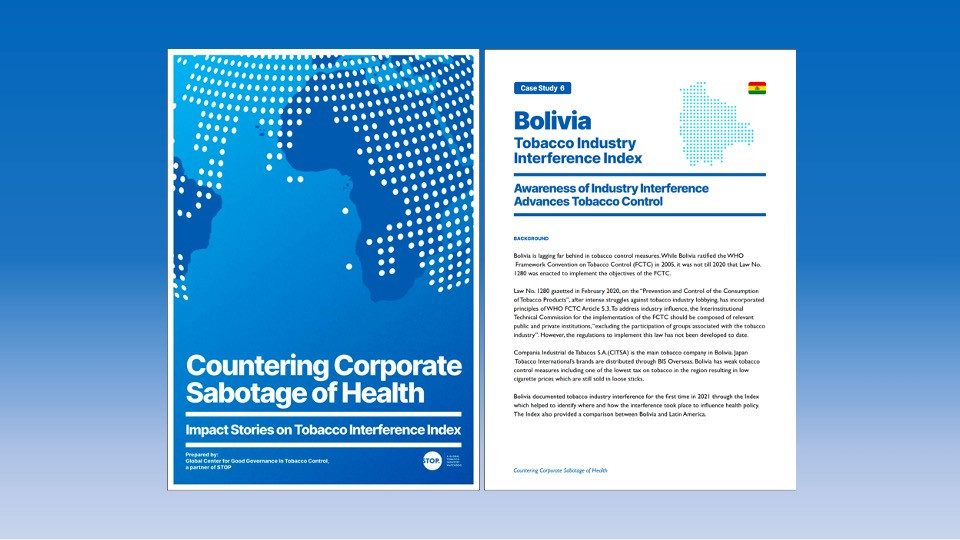Awareness of Industry Interference Advances Tobacco Control

“The Index created greater awareness on tobacco control among the public and exposed the tactics of the industry. It helped resume talks with the Ministry of Health to promote the Regulation of the 2020 Tobacco Control Law that has been delayed.”
Alejandra Karina Garrón Monje
Director, Healthy Bolivia Foundation/ Alianza Por La Salud
Background
Bolivia is lagging far behind in tobacco control measures. While Bolivia ratified the WHO Framework Convention on Tobacco Control (FCTC) in 2005, it was not till 2020 that Law No. 1280 was enacted to implement the objectives of the FCTC.
Law No. 1280 gazetted in February 2020, on the "Prevention and Control of the Consumption of Tobacco Products", after intense struggles against tobacco industry lobbying, has incorporated principles of WHO FCTC Article 5.3. To address industry influence, the Interinstitutional Technical Commission for the implementation of the FCTC should be composed of relevant public and private institutions, “excluding the participation of groups associated with the tobacco industry". However, the regulations to implement this law has not been developed to date.
Compania Industrial de Tabacos S.A.(CITSA) is the main tobacco company in Bolivia. Japan Tobacco International’s brands are distributed through BIS Overseas. Bolivia has weak tobacco control measures including one of the lowest tax on tobacco in the region resulting in low cigarette prices which are still sold in loose sticks.
Bolivia documented tobacco industry interference for the first time in 2021 through the Index which helped to identify where and how the interference took place to influence health policy. The Index also provided a comparison between Bolivia and Latin America.
Launch of Index
Following the international launch of the Global Tobacco Industry Interference Index in November 2021, FIC Bolivia launched the national index in February 2022 in collaboration with members of the Alliance for Health (APL). The findings of the Index were presented to the Ministry of Health and Sports to conclude the revision of the Regulations on Law 1280 on tobacco control enacted in February 2020.
Extensive media advocacy was conducted on the findings which received wide coverage (Figure 1). Informative banners were created and uploaded on social media. The executive summary of the Index prepared by GGTC were used for dissemination to the TV, radio, press and digital media.
Outcome of Advocacy with the Index
Through the active participation of civil society through the Index, the public was made aware of the importance of tobacco control policies and how the tobacco industry was blocking or undermining strong policies to protect health. The media played an important role to publicize the findings and shine the light on the industry interference (Figure 2). Using various media platform is a good strategy to reach a broader audience.
The Index made it possible to resume talks with the Ministry of Health to promote the Regulation of Tobacco Control Law No. 1280 of February 13, 2020. This Law granted 180 calendar days to approve a Regulation through a Supreme Decree through the Executive Organ (Power) of the Ministry of Health and Sports. However, the Index revealed that this important timeline was omitted due to tobacco industry interference to the mandate the Law resulting in 24 months delay. It prevented the Law from being implemented. Advocacy efforts directed at implementing the law continue.
About Healthy Bolivia Foundation (FIC): FIC Bolivia has an extensive experience in the generation, implementation and monitoring of tobacco control policies in the country. FIC is committed to promoting tobacco control through unmasking the practices of the tobacco industry and countering its interference in public policies.
